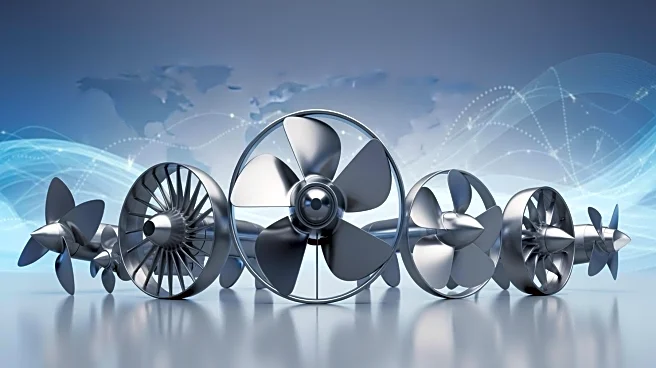What's Happening?
The marine propellers market is experiencing significant growth, driven by technological advancements and the resurgence of global trade routes. The market, valued at USD 5.79 billion in 2024, is projected
to grow at a CAGR of 3.66% from 2025 to 2032, reaching nearly USD 7.72 billion. Key factors contributing to this growth include increased global seaborne trade, shipbuilding activities, and the adoption of improved fuel-efficient propulsion systems. The market is also benefiting from hybrid propulsion technology, which offers opportunities for shipbuilders, suppliers, and the naval sector worldwide. The Asia Pacific region is expected to dominate the market due to its strong shipbuilding industry and competitive manufacturing capabilities.
Why It's Important?
The growth of the marine propellers market is significant for several reasons. It reflects the broader trend of increasing global trade and the need for efficient maritime logistics. As countries invest in sustainable shipping and hybrid propulsion technologies, the market is poised to support environmental goals by reducing carbon emissions and improving energy efficiency. This growth also presents opportunities for innovation in marine technology, with advancements in 3D manufacturing, computational fluid dynamics, and AI-driven predictive maintenance. However, the market faces challenges from tightening environmental regulations, which may impact profitability in the short term. Overall, the expansion of the marine propellers market is crucial for supporting global trade and advancing sustainable maritime practices.
What's Next?
The marine propellers market is expected to continue its growth trajectory, driven by ongoing technological advancements and the expansion of global trade. Shipbuilders are likely to invest in research and development to meet environmental standards and improve propeller performance. The market will also benefit from the modernization of naval fleets and the increasing demand for high-power propeller systems across various vessel types. As countries focus on sustainable shipping practices, the adoption of hybrid propulsion technologies and low-carbon fuels will become more prevalent. Additionally, the market may see increased demand from the marine tourism industry and offshore oil-related activities, further supporting its growth.
Beyond the Headlines
The marine propellers market's growth has deeper implications for environmental sustainability and technological innovation. As shipbuilders adopt hybrid-electric and battery-assisted propulsion systems, they are contributing to the reduction of carbon emissions and promoting cleaner maritime practices. The market's expansion also highlights the importance of international collaboration in addressing environmental challenges and advancing maritime technology. Furthermore, the development of lightweight, corrosion-resistant, and energy-efficient propellers reflects the industry's commitment to meeting evolving regulations and consumer demands. These advancements may lead to long-term shifts in the maritime industry, promoting sustainable practices and enhancing global trade efficiency.









